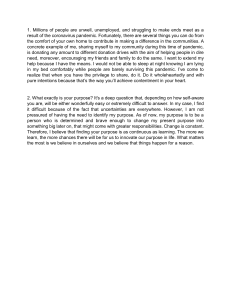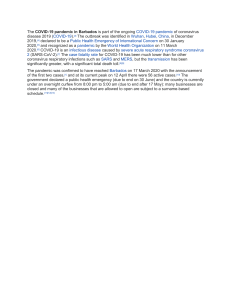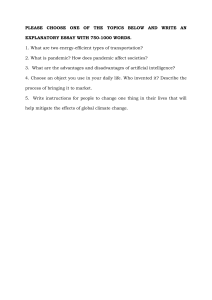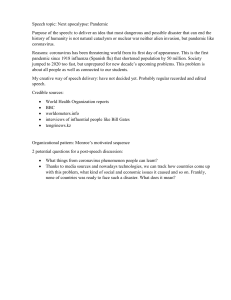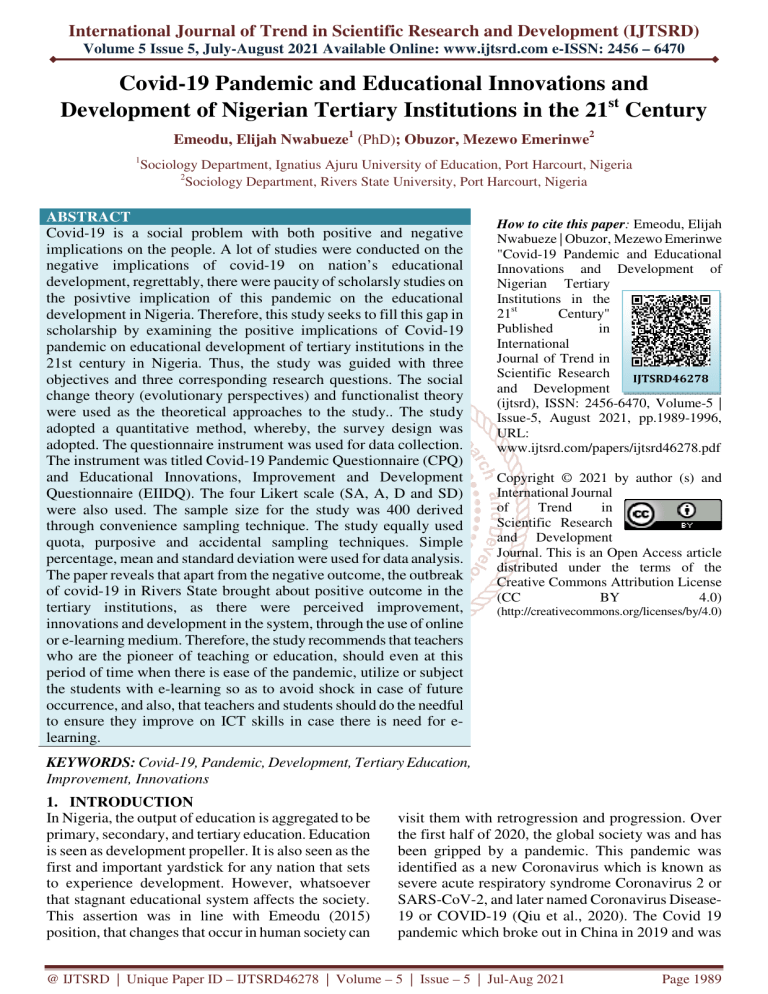
International Journal of Trend in Scientific Research and Development (IJTSRD)
Volume 5 Issue 5, July-August 2021 Available Online: www.ijtsrd.com e-ISSN: 2456 – 6470
Covid-19 Pandemic and Educational Innovations and
Development of Nigerian Tertiary Institutions in the 21st Century
Emeodu, Elijah Nwabueze1 (PhD); Obuzor, Mezewo Emerinwe2
1
Sociology Department, Ignatius Ajuru University of Education, Port Harcourt, Nigeria
2
Sociology Department, Rivers State University, Port Harcourt, Nigeria
ABSTRACT
Covid-19 is a social problem with both positive and negative
implications on the people. A lot of studies were conducted on the
negative implications of covid-19 on nation’s educational
development, regrettably, there were paucity of scholarsly studies on
the posivtive implication of this pandemic on the educational
development in Nigeria. Therefore, this study seeks to fill this gap in
scholarship by examining the positive implications of Covid-19
pandemic on educational development of tertiary institutions in the
21st century in Nigeria. Thus, the study was guided with three
objectives and three corresponding research questions. The social
change theory (evolutionary perspectives) and functionalist theory
were used as the theoretical approaches to the study.. The study
adopted a quantitative method, whereby, the survey design was
adopted. The questionnaire instrument was used for data collection.
The instrument was titled Covid-19 Pandemic Questionnaire (CPQ)
and Educational Innovations, Improvement and Development
Questionnaire (EIIDQ). The four Likert scale (SA, A, D and SD)
were also used. The sample size for the study was 400 derived
through convenience sampling technique. The study equally used
quota, purposive and accidental sampling techniques. Simple
percentage, mean and standard deviation were used for data analysis.
The paper reveals that apart from the negative outcome, the outbreak
of covid-19 in Rivers State brought about positive outcome in the
tertiary institutions, as there were perceived improvement,
innovations and development in the system, through the use of online
or e-learning medium. Therefore, the study recommends that teachers
who are the pioneer of teaching or education, should even at this
period of time when there is ease of the pandemic, utilize or subject
the students with e-learning so as to avoid shock in case of future
occurrence, and also, that teachers and students should do the needful
to ensure they improve on ICT skills in case there is need for elearning.
How to cite this paper: Emeodu, Elijah
Nwabueze | Obuzor, Mezewo Emerinwe
"Covid-19 Pandemic and Educational
Innovations and Development of
Nigerian Tertiary
Institutions in the
Century"
21st
Published
in
International
Journal of Trend in
Scientific Research
IJTSRD46278
and Development
(ijtsrd), ISSN: 2456-6470, Volume-5 |
Issue-5, August 2021, pp.1989-1996,
URL:
www.ijtsrd.com/papers/ijtsrd46278.pdf
Copyright © 2021 by author (s) and
International Journal
of
Trend
in
Scientific Research
and Development
Journal. This is an Open Access article
distributed under the terms of the
Creative Commons Attribution License
(CC
BY
4.0)
(http://creativecommons.org/licenses/by/4.0)
KEYWORDS: Covid-19, Pandemic, Development, Tertiary Education,
Improvement, Innovations
1. INTRODUCTION
In Nigeria, the output of education is aggregated to be
primary, secondary, and tertiary education. Education
is seen as development propeller. It is also seen as the
first and important yardstick for any nation that sets
to experience development. However, whatsoever
that stagnant educational system affects the society.
This assertion was in line with Emeodu (2015)
position, that changes that occur in human society can
visit them with retrogression and progression. Over
the first half of 2020, the global society was and has
been gripped by a pandemic. This pandemic was
identified as a new Coronavirus which is known as
severe acute respiratory syndrome Coronavirus 2 or
SARS-CoV-2, and later named Coronavirus Disease19 or COVID-19 (Qiu et al., 2020). The Covid 19
pandemic which broke out in China in 2019 and was
@ IJTSRD | Unique Paper ID – IJTSRD46278 | Volume – 5 | Issue – 5 | Jul-Aug 2021
Page 1989
International Journal of Trend in Scientific Research and Development @ www.ijtsrd.com eISSN: 2456-6470
declared a global pandemic by the World Health
Organization in March 2020 was first reported in
Nigeria on February 28, 2020. The disease, which
was code-named COVID-19 has recorded over 40
million cases and more than 1 million deaths globally
(WHO, 2020).
Covid-19 as a pandemic is explained to mean a largescale outbreak of infectious disease that can greatly
increase morbidity and mortality over a wide
geographical area and causes significant educational,
economic, social and political disturbances. The
covid-19 pandemic has increased due to a persistent
increases in global travel and integration,
urbanization, amongst others. In Rivers state, the
virus registered its presence on 25 March 2020 and
has infected over 4,745 persons taken 77 lives as of
23 January 2021(Wakama, 2021).Within this period
(2000-2021), the Covid-19 pandemic outbreak has
plotted great phobia in the minds of Nigerians
educationally, socially, religiously and economically.
This has made students in different educational
sections among Nigeria citizens barely embark fully
on the normal school activities as compared to the
pre-covid- 19 pandemic outbreaks.
According to the UNESCO monitoring report on
COVID-19 educational disruption and response
(2020), the impact of school closures in over 100
countries that have implemented the decisions around
the world has impacted over 90 percent of the global
student population. In taking this decision, Nigeria is
not excluded from this impact. In the view of Nigeria
Education in Emergencies Working Group (2020)
accounts that close to about 46 million students
throughout the country will be affected, not only that
but about 40,000 Internally Displaced Persons (IDPs)
children will be giving some form of learning in
camps and host communities will be affected by
stoppage of learning in schools.
This shows that the educational sector is also greatly
affected by the deadly virus, and will have to adapt to
the change. Presently, in the mode of teaching; many
schools in Nigeria and around the globe, have
adopted the online teaching method while for the
younger ones, their parents have become their
teachers or merely get teachers to teach their kids at
home. While many European countries have
successfully implemented their school setting using
online digital tools like zoom or google meet. Many
questions have been raised on this; can Nigerian
education survive the online teaching methods,
coupled with the unavailable network and high rate of
purchasing data? In essence, the virus; COVID-19
would be seen in education as a result of the changes
in modes of teaching and how students relate in
schools, the ability to adapt to this remains a question
to be answered. However, this pulse a fear in the
minds of parents and guardians as regards the
student's ability to recall and regain all that they’ve
been taught. Despite this, covid-19 has equally
contributed to educational changes and development.
This is true as the means of pedagogy changed using
media platforms such as radio, television, WhatsApp,
Zoom and many more. This innovation in the
educational sector was not effectively utilized until
the outbreak of covid-19 that brought about social
distancing, lockdown, inter-state bane and others.
This led to innovation and advancement in the
educational system to ensure continuity of the process
until normalcy was restored. It was obvious that
covid-19 came as a shock and affected both the rich
and poor, yet educational communities proved tough
and acted accordingly to ensure an innovative
approach to set the pace rolling so as to reduce the
loss. The effort made for alternative learning would
lead to the future of education we want, which
involves an inclusive change in education delivery.
Statement of the Problem
The COVID-19 pandemic has not stopped at national
borders. It has affected people regardless of
nationality, level of education, income, or gender. But
the same has not been true for its consequences,
which have hit the most vulnerable hardest. Education
is no exception. Students from privileged
backgrounds, supported by their parents and eager
and able to learn could find their way past closed
school doors to an alternative learning opportunities.
Those from disadvantaged backgrounds often
remained to shut out when their schools shut down.
This crisis has exposed the many inadequacies and
inequities in our education systems from access to the
broadband and computers needed for online
education, and the supportive environments needed to
focus on learning, up to the misalignment between
resources and needs.
As for the challenges it has posed, in a general
perspective, Wakama (2021) study examined
Covid19 victims and family members in River State;
it revealed that coronavirus was and is still
responsible for shutting down various aspects of
human livelihood, as well as various sectors of the
global economy, thereby having grave educational,
social, economic and psychological consequences on
the entire global world.
Orji Okade (2020) study on the impact of the
COVID-19 pandemic on education in Nigeria,
discovered that covid-19 has collapsed the
educational system in Nigeria. Several problems have
been recorded in the process of the pandemic
@ IJTSRD | Unique Paper ID – IJTSRD46278 | Volume – 5 | Issue – 5 | Jul-Aug 2021
Page 1990
International Journal of Trend in Scientific Research and Development @ www.ijtsrd.com eISSN: 2456-6470
including the collapse of the 2019/2020 academic
calendar, delay in students’ promotion and graduation
etc. To him, he only considered the negative impact
of covid-19 on the educational system.
In a different perspective from the above, Hillary
Dupke (2020), investigated on the impact of COVID19 on education-Insights from Education at a Glance,
Kwara State University, Nigeria, revealed that as the
world becomes increasingly interconnected, so do the
risks we face. The lockdowns in response to COVID19 have interrupted conventional schoolings with
nationwide school closures in most OECD and
partner countries, the majority lasting at least 10
weeks. While the education community has made
concerted efforts to maintain learning continuity
during this period, children and students have had to
rely more on their resources to continuity during
learning remotely through the internet, television, or
radio. Teachers also had to adapt to new pedagogical
concepts and modes of delivery of teaching for which
they may not have been trained. In particular, learners
in the most marginalized groups, who don’t have
access to digital learning resources or lack the
resilience and engagement to learn on their own, are
at risk of falling behind. The paper only looked at the
challenges of covid-19, but in support for innovation
in the academic field if the necessary incentives are
provided.
Duraku (2020) in a study that investigated the impact
of COVID-19 on education and the well-being of
teachers, parents, and students: Challenges related to
remote (online) learning and opportunities for
advancing the quality of Education, revealed that the
closure of educational institutions due to preventive
measures against the spread of COVID-19 has
affected the education, well-being and functioning of
all parties involves and benefiting from educational
systems in the world. While the process of shifting
learning to a remote or online format has already
become part of many educational institutions in
different parts of the world, several factors related to
the quality of educational institutions, teachers,
parents and students, in conjunctions which changes
to their emotional states are assumed to be
contributing factors that may affect the quality of
remote or online learning, teacher performance,
student knowledge and skills. The findings of this
confirm the readiness and motivation of teachers to
advance their knowledge and skills, as well as to
contribute with the aim of advancing the quality of
education. Opportunities to advance the quality of
online learning, the support of teachers, parents and
families, coupled with practical suggestions for
parties involved in the field of education, are also
included. Therefore, the paper eventually considered
innovation as a way of improving education.
A survey of the Experience and Opinion of Educators
and Technology Specialists in September 2020,
highlighted the effect of Covid-19 on Education and
its implications for the use of Technology. This report
and the survey findings behind it provide a unique
insight into the perspectives of EdTech experts
regarding the impact of the Covid-19 pandemic on
education in Africa. It is based on the findings of a
survey of the eLearning Africa network, which
attracted approximately 1650 responses from
respondents in 52 countries in Africa. 15 countries
(29%) provide 1217 (73%) of the 52% of the
respondents are directly involved in the education
sectors and 9% are in the ICT sector. 71% work for
the government or not-for-profit organizations, and
21% for for-profit businesses. 40% are
teachers/lecturers/professors,
and
13%
are
ICT/EdTech specialists or entrepreneurs.
Therefore, the reviewed studies of scholars have been
able to look at the effects of the Covid 19- pandemic.
But none of the studies was able to investigate the
Covid-19 pandemic and educational development of
Nigerian tertiary institutions in the 21st century using
two tertiary institutions in Rivers State. It was at this
point that the study looked at the functional role of
covid-19 in Nigeria's educational system as it brought
about innovation and development to the system.
Objectives of the Study
1. To establish the nature of pedagogy before the
emergence of covid-19 in tertiary institutions in
Rivers State
2. To identify the substitute method of evaluation of
students during the covid-19 in tertiary
institutions in Rivers State
3. To establish the improvement, innovation and
development made in educational sector during
covid-19 in tertiary institutions in Rivers State
Research Questions
1. Can one establish the nature of pedagogy before
the emergence of covid-19 in tertiary institutions
in Rivers State?
2. Can one establish the substitute method of
evaluation of students during the covid-19 in
tertiary institutions in Rivers State?
3. Can one establish the improvement innovation
and development made in the educational sector
during covid-19 in tertiary institutions in Rivers
State?
Study Location
The study was carried in Rivers State which is one of
the oil-rich states in the south-south region of Nigeria.
@ IJTSRD | Unique Paper ID – IJTSRD46278 | Volume – 5 | Issue – 5 | Jul-Aug 2021
Page 1991
International Journal of Trend in Scientific Research and Development @ www.ijtsrd.com eISSN: 2456-6470
Specifically, the study captured two tertiary
institutions in Rivers State such the Ignatius Ajuru
University of Education and Rivers State University.
These two universities were selected for the study as
representatives of other tertiary institutions in Rivers
State. They are situated in Port Harcourt metropolis
precisely in Obio-Akpor local government area,
Rivers State. Rivers State is among the 36 states in
Nigeria. Rivers State came into existence under
Decree No. 14 of 1967 by General Yakubu Gowon's
administration on the 27th of May 1967. The state
was made up of provinces from the former eastern
region of Nigeria. Rivers State has a total area of
11,077 km² (4,277 mi²), with an estimated population
of
7,043,800
people
in
2015
(https://www.citypopulation.de/php/nigeria-admin).
Rivers State is located in the delta region (SouthSouth Zone) of Southern Nigeria. Rivers State is
constrained on the North by Anambra, Imo, and the
Abia States; the South by the Atlantic Ocean, the
West by Bayelsa and Delta States; and the East by
AkwaIbom State.
2. Theoretical Framework
Social Change Theory: The study used the social
change theory. Therefore, it adopted the evolutionary
perspective of social change. The theory was used by
many scholars, but this study adopts Anthony
Giddens's
framework
titled
‘Time-Space
Distanciation’ or Distanciationtheory(2009) as it
relates to social change theory. According to Giddens,
social life consists of interactions that are face-to-face
or remote. Time-Space Distanciationdescribes the
process whereby remote interaction has become an
increasingly significant feature of human life, and
through which social systems that were previously
distinctive
have
become
connected
and
interdependent. Giddens was referring to
globalization which in 2009 defined globalization as
the intensification of worldwide social relations
which link distant localities in such a way that local
happenings are shaped by events occurring many
miles away and vice versa. Because society has
become, what affects one nation affects the others.
This explains why all countries around the world
were affected by the plague of covid-19. Also,
Emeodu (2015) in his study gave some assumptions
of social change theory. To him, social change may
be driven by cultural, scientific, or technological
forces. He added that social change may bring about
progress and can also bring about retrogression. This
theory is useful to the study as it explains the positive
impact of covid-19 brought about by scientific or
technological forces which impact led to educational
innovation, improvement and development in Rivers
state tertiary institutions.
Structural Functionalism (Functionalist Theory):
The study also adopted Structural Functionalism
(Functionalist Theory).Notable scholars or founders
of this theory are Emile Durkheim (1893), August
Cornte, Herbert Spencer, Talcott Parson (1961) and
Robert Merton (1968).However, Durkheim is often
cited as having had a profound influence on the
development of functionalism (Okodudu, 2007) as
well as Talcott Parsons. According to Haralambos
and Holborn (2008), it avers that functionalism
explains how the social structure of the social
functions for the effective sustainability of the
society. This involves an examination of the
relationship between the different parts of the
structure and the relationship to society as a whole.
Hence, reveals the functions of institutions. In
practice, the term function is usually used to indicate
the contribution an institution makes to the
maintenance and survival of the social system.
Furthermore, the functionalist sees society as a
system. A system is an entity made up of
interconnected and interrelated parts. From this
viewpoint, it follows that each part will in some way
affect every other part and the system as a whole. It
also follows that, if the system is to survive, its
various parts must have some degree of compatibility.
Hence, there is a need to integrate with other parts.
They added that if any of the parts suffer or faces
abnormality, it affects the whole part.
Relating this theory of our study, the covid-19
pandemic ought to be a health issue that should
primarily affect the health sector in society, for the
fact that what affects one sector of the society affects
others, every other institution was affected by the
pandemic. The world economy was affected, politics
was affected, the social gathering was affected,
education was affected, religion was affected, and so
many other areas of human survival and endeavor
were affected by a single pandemic that attacked the
health institution of the society. The diverse effects of
Covid-19 pandemic on all other institutions of the
society have justified the theoretical assumptions of
the functionalist theory.
3. Literature Review
Covid 19 Pandemic: the concept of the Covid 19
pandemic is a new concept that is evolving because
the virus just surfaced recently in China. Covid 19 is
defined as an illness caused by a novel Coronavirus
now called severe acute respiratory syndrome
coronavirus 2 which was first identified amid an
outbreak of respiratory illness cases in Wuhan City,
Hubei Province, China. It was initially reported to the
WHO on December 31st, 2019. On January 30, 2020,
the World Health Organization declared the Covid 19
@ IJTSRD | Unique Paper ID – IJTSRD46278 | Volume – 5 | Issue – 5 | Jul-Aug 2021
Page 1992
International Journal of Trend in Scientific Research and Development @ www.ijtsrd.com eISSN: 2456-6470
outbreak a global health emergency (David,
2021).The COVID-19 pandemic in Nigeria is part of
the worldwide coronavirus disease 2019 caused by
severe acute respiratory syndromes coronavirus
which was first reported in the country on 27
February 2020 when an Italian citizen in Lagos tested
positive for the virus. Since its appearance in the
shore of Nigeria the pandemic has continued to
permeate its tentacles across the spheres of the
country unabatedly. The government at all levels has
taken confrontational and decisive measures to curb
the spread of the virus which has to some extent
slowed the spread. As part of social distancing,
businesses, schools, community centres, and nongovernmental organization (NGOs) have been
required to close down, mass gatherings have been
prohibited, and lockdown measures have been
imposed in many countries, allowing travel only for
essential needs. The goal is that through social
distancing, countries will be able to “flatten the
curve”, i.e., reduce the number of new cases related to
COVID-19 from one day to the next in order to halt
exponential growth and hence reduce pressure on
medical services (John Hopkins University, 2020a,b).
Education: The term “education” although used by
many is difficult to define, partly because it has a
wide variety of meanings, partly because it involves
not only one but several complex processes. Due to
the complex nature and broadness of education, it is
difficult for any definition to be comprehensive
enough to satisfy the numerous concepts and
interpretations, Ogbondah (2002). Plato (1993) who is
one of the earliest moral philosophers, defined
education as “that training which is given by suitable
baits to the first instinct of virtue in children when
pleasure and pain are rightly implanted in rational
souls.” Again, definitions of education are either
sociological or humanistic. In other words, education
is either applied as an acculturation of the child to do
the will of the society or leading the child to develop
his in-built potentials, taking into cognizance his age,
interest and ability, among others (Amaele, 2005).
4. Methodology
This paper adopted a survey research design. The work used primary source (questionnaire) and secondary
sources of data to collect information from the respondents such as published and unpublished materials. The
instrument was titled Covid-19 Pandemic Questionnaire (CPQ) and Educational Innovations, Improvement and
Development Questionnaire (EIIDQ). The four Likert Scales of SA, A, D and SD were used. Hence, the
population of the study constituted of all the staff and students (both undergraduate and postgraduate students) of
Ignatius Ajuru University of Education (IAUE) and Rivers State University (RSU). The sample size was 400
using the convenience sampling technique for the selection. Quota sampling was used to allocate 200 samples to
each institution for fairness and equity in distribution. After this, the purposive and accidental sampling
techniques were used to reach the respondents and were aided by the help of research assistants. The collected
data were analyzed using simple percentages for biodata, the standard deviation for research questions.
5. Data Analysis and Discussion
Table 1: Socio-Demographic Characteristics of Respondents (N = 400)
Variables
Frequency Percentage
Gender
Male
200
50%
Female
200
50%
AGE
20-29 years
85
21.25%
30-39 years
95
23.75%
40-49 years
100
25%
50-59 years
70
17.5%
60 years and above
50
12.5%
Categories of Respondents
Staffs
150
37.5%
Students
250
62.5%
Fieldwork (2021)
The above table shows various demographic characteristics of respondents, ranging from age, gender, and
categories of respondents. This, therefore, included both undergraduate and postgraduate students.
Research Question 1: Can one establish the nature of pedagogy before the emergence of covid-19 in
tertiary institutions in Rivers State?
@ IJTSRD | Unique Paper ID – IJTSRD46278 | Volume – 5 | Issue – 5 | Jul-Aug 2021
Page 1993
International Journal of Trend in Scientific Research and Development @ www.ijtsrd.com eISSN: 2456-6470
Table 2: showing mean and standard deviation score on the nature of pedagogy before the emergence
of covid-19 in tertiary institutions in Rivers State.
S/N
Questionnaire Items
NO MEAN SDT REMARK
1 Teachers only have face to face contact with students
400
3.76
0.65 Accepted
2 Exams were only conducted in the classroom
400
3.40
0.63 Accepted
3 Classrooms were the only means of teaching and learning
400
3.97
0.89 Accepted
Students learn together with other students before the
4
400
3.34
0.64 Accepted
outbreak of covid-19
Evaluation of learning behavior was easier as teacher and
5
400
3.23
0.71 Accepted
students interface
Most classrooms were flooded with students and many
6
400
3.21
0.68 Accepted
students pay less attention
Most lecturers before the Covid-19 outbreak dictate note and
7
400
3.40
0.62 Accepted
hardly teach.
Grand Mean
3.47
0.69 Accepted
Source: Fieldwork (2021).
The table highlighted the score for the nature of pedagogy before the emergence of covid-19 in tertiary
institutions in Rivers State. The homogeneity in response among the responses of the respondents implies that all
the items support that they are the nature of pedagogy before the emergence of covid-19 in tertiary institutions in
Rivers State.
Research Question 2: Can one establish the substitute method of evaluation of students during the covid19 in tertiary institutions in Rivers State?
Table 3: showing mean and standard deviation score on the substitute method of evaluation of
students during the covid-19 in tertiary institutions in Rivers State
S/N
Questionnaire Items
NO MEAN SDT REMARK
Do you think that covid-19 led to improvement in the use of
8
400
3.47
0.69 Accepted
IT tools
9 Use of WhatsApp for teaching and learning
400
3.54
0.65 Accepted
10 Defense was done online
400
3.47
0.74 Accepted
Invitation of some students for defense was done with proper
11
400
3.43
0.68 Accepted
protection technique, using hand sanitizer and nose-mask
12 Exams were also tried online using students platform
400
2.90
0.96 Accepted
13 The use of zoom app as instructional techniques
400
3.54
0.65 Accepted
Grand Mean
3.39
0.72 Accepted
Source: Fieldwork (2021).
The table above shows the score of the substitute method of evaluation of students during the covid-19 in tertiary
institutions in Rivers State. Given the uniform response among the respondents shows that all the items were
substituted methods of evaluation of students during the covid-19 in tertiary institutions in Rivers State. This
finding is in tandem with a report of the survey of the Experience and Opinion of Educators and Technology
Specialists on September 2020, on the effect of Covid-19 on Education and its implications for the use of
Technology which provided a unique insight into the perspectives of EdTech experts regarding the impact of the
Covid-19 pandemic on education in Africa. That indeed, the covid-19 provided a platform for e-learning. This,
therefore, was what tertiary institutions in Rivers State did by utilizing various learning platforms such as Zoom,
WhatsApp, and other platforms that proved their advancement and development in the teaching and learning
process.
Research Question 3: Can one establish the improvement, innovation and development made in the
educational sector during covid-19 in tertiary institutions in Rivers State?
@ IJTSRD | Unique Paper ID – IJTSRD46278 | Volume – 5 | Issue – 5 | Jul-Aug 2021
Page 1994
International Journal of Trend in Scientific Research and Development @ www.ijtsrd.com eISSN: 2456-6470
Table 4: showing mean and standard deviation score on the improvement, innovation and
development made in educational sector during covid-19 in tertiary institutions in Rivers State
Questionnaire Items
Mean SD Remark
S/N
Do you think that after the emergence of covid-19, there have been
14 innovation, improvement and development of education in what use to
3.43 0.68 Accepted
be
Through the various platform used for teaching during the covid-19,
15 other related pandemic may not easily affect the tertiary institution
3.47 0.74 Accepted
processes
Our educational system have seen the challenges that erupted during
16 the process of covid-19, therefore can mitigate those challenges to be
3.54 0.65 Accepted
more digitalized
Do you think that both students and staffs have recently get more
17
3.52 0.72 Accepted
attached to ICT tools than before
Grand Mean
3.49 0.69 Accepted
Source: Fieldwork (2021).
The table shows mean and standard deviation scores on the improvement, innovation and development made in
the educational sector during covid-19 in tertiary institutions in Rivers State. Hence, item 14 had a mean and
standard deviation scores of (M=3.43 & SD=0.68). Furthermore, item 15 had mean and standard deviation
scores of (M=3.47 & SD=0.73). Item 16 had mean and standard deviation scores of (M=3.54 & SD=0.65). Also,
item 17 had mean and standard deviation scores of (M=3.52 & SD=0.72). Given that all the items were accepted,
it is proved that the respondents supported that tertiary institutions in Rivers State made some improvement,
innovation and development during the Covid-19 pandemic. Connecting the findings with that of Emeodu
(2015), it reveals that when changes occur in human society, they can bring about retrogression and progression.
Thus, the outbreak of covid-19 in Tertiary institutions in Rivers State brought about the positive outcomes as
there are a perceived improvement, innovation and development in the system. Again, the findings are in line
with the view of Duraku (2020) that pointed that if opportunities are given, it will advance the quality of online
learning and also gives support to the teachers, parents and families, coupled with practical suggestions for
parties involved in the field of education in all it will advance the Educational system.
6. Conclusion/Recommendations
The study through its findings has shown that what
use to be before covid-19 was transformed into
another digitalized process. Learning processes were
changed and it led to innovative and improved
learning approaches. Most studies by some scholars
only considered the effect of covid-19. The study
shows that Zoom-App and WhatsApp was the major
platform used during the heat of the covid-19 in
Rivers State. There existed some challenges that
erupted which need modifications for more
educational advancement and development. Based on
this, the study recommends the following:
1. Government, communities and stakeholders to
put hand together to improve and advance the
educational system to face the heat of any
pandemic, to ensure more progress in the
Nigerian educational system. This can be
achieved by ensuring that funds are provided to
students, as well as training and other facilities to
improve capacity.
2. Teachers and students should do the needful to
ensure they improve on ICT skills in case there is
a need for e-learning.
3. Teachers who are the pioneer of teaching or
education, should even at this period whereby
there is the ease of the pandemic, utilize or
subject the students with e-learning so as to avoid
shock in case of future occurrence.
4. As many students and teachers complained of
power supply and internet or network hiccups,
there is a need for improved electricity and
network as, through this, the ICT platform for
teaching and learning can be effectively utilized.
References
[1] Amaele, S. (2005). Understanding philosophy
of Education. Bounty Peers Ltd.
[2]
David, J. (2021). What is covid 19?
www.medcape.com
[3]
Emeodu, E.N. (2015). Information technology
and devaluation of values in Nigeria. An
Unpublished Project, Department of Social
Studies, IAUE Rivers State
[4]
Emile, D.. (1961). Moral Education. Free
Press.
[5]
Emile, D., (1893). Functionalism, Anomie and
Division
of
Labour.
http://education-
@ IJTSRD | Unique Paper ID – IJTSRD46278 | Volume – 5 | Issue – 5 | Jul-Aug 2021
Page 1995
International Journal of Trend in Scientific Research and Development @ www.ijtsrd.com eISSN: 2456-6470
portal.com/academy/lesson/emile-durkheimstheoriesfunctionalism-anomie-and-division-oflabor.html#lesson
[6]
Giddens, A., (2009). Sociology. Polity Press.
[7]
Haralambos, M, &Holborn, M. (2008).
Sociology themes and perspectives. Harper
Collins Publisher Limited.
[8]
[9]
John Hopkins University. (2020a). New cases
of covid-19 in world countries. Johns Hopkins
Coronavirus
Resource
Center.
https://coronavirus.jhu.edu/data/new-cases
John Hopkins University. (2020b). Mortality
analyses. Johns Hopkins Coronavirus Resource
Center.
https://coronavirus.jhu.edu/data/mortality
[10]
Merton, R. K. (1968). Social theory and social
structure. . Free Press.
[11]
Okodudu, S.A. (2007). Fundamentals of
Sociology.
Amethyst
and
Colleagues
Publishers.
[12]
Parsons, T. (1961). The school class as a social
system. New York Press.
[13]
Plato (1993). The Cambridge companion to
Plato. Cambridge University Press.
[14]
World Health Organization (WHO) (2020).
Corona
virus
disease
(COVID-19),
www.who.int/doc/defaultsource/coronavirus/sit
uation-reports/20201005-
@ IJTSRD | Unique Paper ID – IJTSRD46278 | Volume – 5 | Issue – 5 | Jul-Aug 2021
Page 1996



